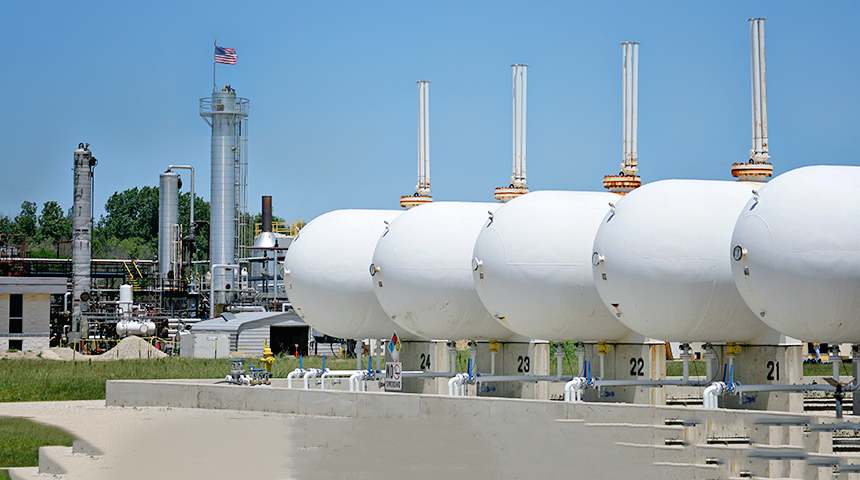Natural gas testing and analysis expertise.
Intertek laboratories provide natural gas quality and component analysis. Natural gas testing includes the analysis of conventional and shale gas, LNG, and other hydrocarbon condensates and components. Gases analyzed include hydrocarbons (C1 to C6+) such as methane, ethane, propane, iso-butane, n-butane, iso-pentane, n-pentane, and hexane, plus heavier molecules. Natural gas labs test to trace detection levels for impurities. Natural gas trace impurities include hydrogen, nitrogen, carbon monoxide, carbon dioxide, oxygen, mercury, sulfur, water, and other components.
| Natural Gas Test | Natural Gas Test Methods | |
| Natural Gas Composition Analysis: | ASTM D1945, GPA 2261, ISO 6974, UOP 539, GC-MS, etc. | |
| Methane | mol % | |
| Ethane C2 | mol % | |
| Propane C3 | mol % | |
| Iso Butane C4 | mol % | |
| Normal Butane | mol % | |
| Iso Pentane C5 | mol % | |
| Normal Pentane | mol % | |
| Hexane plus Heavier | mol % | |
| Total C6 carbon | mol % | |
| Total C7 carbon | mol % | |
| Trace Metals in Natural Gas | Ppm | |
| Nitrogen | mol % | |
| Carbon Dioxide | mol % | |
| Oxygen | mol % | |
| Total Sulfur | ASTM D5504, ISO 6326, etc. | |
| Hydrogen Sulfide | ASTM D5504, ISO 6326, etc. | |
| Water | KF | |
| Energy Calculations | ASTM D3588, GPA 2172, ISO 6976 | |
| VaporDensity | Calculated | |
| Relative Density | Calculated | |
| Molecular Weight | Calculated | |
| Gross Heating Value (GHV) | Calculated | |
| Net Heating Value (NHV) | Calculated | |
| Natural Gas Liquids Testing | ||
| Shale Gas Analysis |
LNG Services
Liquefied natural gas (LNG) testing and cargo inspection.
Liquefied natural gas (LNG) is transported by LNG tankers serving markets across the world. Intertek supports the production, transport, storage and custody transfer of LNG cargo with expert LNG cargo inspection, tank calibration and LNG quality testing. Our LNG services support owners, operators, ship-owners, and traders of LNG. We help LNG international clients confidently manage trade risk and exposure.
LNG inspection and testing:
- Custody Transfer Inspection, including Reporting of Energy Calculations
- Master Sales Agreement (MSA) Contract Review and Consultation
- LNG Tank Calibration (Vessel and Shore Tanks)
- Vessel CTMS Factory Acceptance Testing (FAT Inspection for new builds)
- Vessel CTMS Site Acceptance Testing (SAT Inspection for new builds)
- Re-Certification of Vessel CTMS Equipment (for existing fleet)
- Vessel Bunker Stem Survey (Quality and Quantity)
- Delivery and Re-Delivery Inspections (Charterer On-Hire and Off-Hire Inspections)
- LNG Composition and Impurity Testing
- Regulatory Testing for Environmental Compliance
- Mercury Determination by ISO 6978-2:2003
- On-Site Laboratory Services (including equipment and/or manpower to ISO 17025 standard)
- On-Site Operations Services (including manpower for nitrogen injections, etc.)
CNG Quality Testing
Compressed Natural Gas (CNG) quality testing.
Compressed natural gas (CNG) quality can vary depending upon source, location, storage, and transportation methods. CNG can vary in chemical composition, which can effect fuel quality and engine performance and even CNG engine warranty protection.
Intertek laboratories routinely test natural gas and other hydrocarbons for fuel quality parameters, along with chemical and contamination trace analysis, on a regular basis. The labs test to ASTM, ISO, GPA, EPCA, SAE, and other industry accepted quality standards and test methods. Natural gas samples tested include CNG, Liquefied Natural Gas (LNG), well-head gas, and pipeline gases. Compressed natural gas field sampling and shipment options are available.
Available through a global network, lab analysis by Intertek personnel monitors CNG fuel quality, providing clients with data they need to help ensure natural gas fuel quality is acceptable and meets engine requirements.Using gas chromatography, mass spectrometry, and other natural gas analysis methods, Intertek chemists analyze a wide range of components found in natural gas, including methane, ethane, propane, butane, hexane, heptane, octane, hydrogen sulfide, oxygen, nitrogen, and other trace gases and components.
Calculations and additional test results provide CNG heating value, sulfur content, and other quality control and contamination measurements.
Hydrogen Sulfide Management (H2S)
Hydrogen sulfide management in crude oil, natural gas, fuels, and petroleum refined products.
Managing hydrogen sulfide (H2S) is a challenge at every stage of hydrocarbon production, refining, and transportation. Hydrogen sulfide harms product value, compromises environmental and safety compliance, damages infrastructure integrity from corrosion attack, produces odors, and more. Intertek offers expert hydrogen sulfide treatment and management services to help petroleum clients manage H2S problems. H2S treatment and field services include oil reservoir, refinery, storage, and transport operations. Products treated for H2S include crude oil, fuels, and other refined petroleum products in storage tanks, tanker ships, rail-cars, and pipelines.
H2S occurs naturally in crude oil (sour crudes) and can be generated from refining processes, including hydro-cracking, hydrolysis and elemental sulfur production.
Intertek hydrogen sulfide management (H2S):
- Hydrogen Scavenger Additive Treatments for off-specification crude oil and refined product cargo.
- H2S Testing for Bunker Fuels (IP-570)
- Hydrogen Sulfide Testing
- Oil and Gas Corrosion Monitoring
- Reservoir Souring Services
- Crude Oil Rail Car Services


